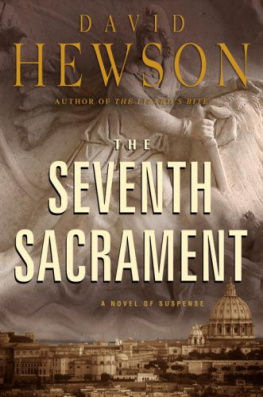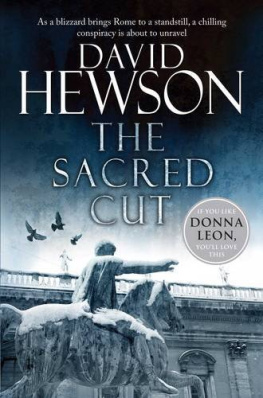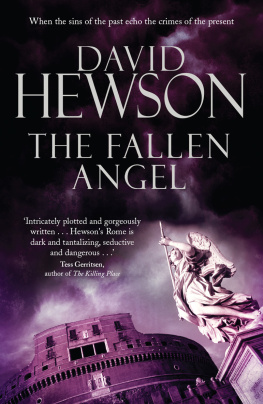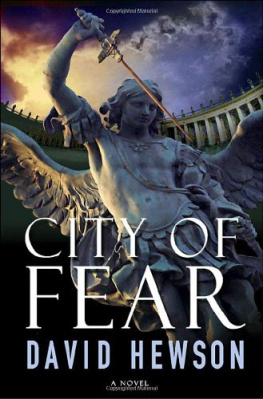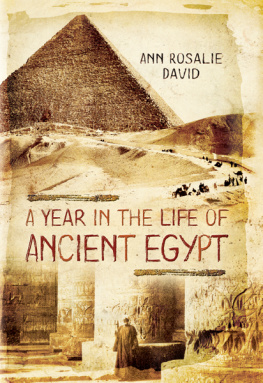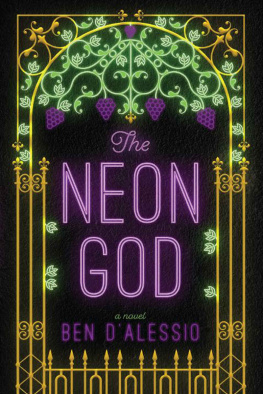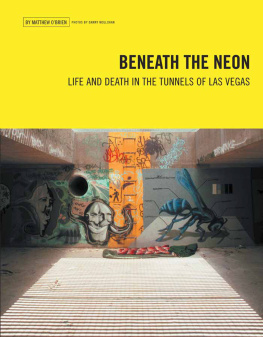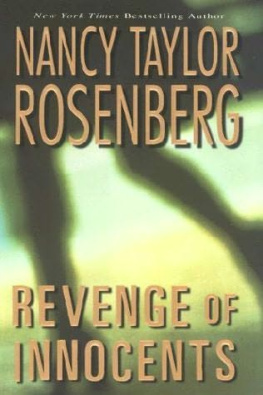ALSO BY DAVID HEWSON

The Lizard's Bite
The Sacred Cut
A Season for the Dead
The Villa of Mysteries
Lucifer's Shadow
About the Author
A FORMER STAFF WRITER ON The Times, David Hewson lives in Kent, where he is at work on his next novel, The Garden of Evil, which Delacorte will publish in 2008.
The Seventh Sacrament is the fifth novel in a crime series which began with the acclaimed A Season for the Dead, set in Rome and featuring Detective Nic Costa.
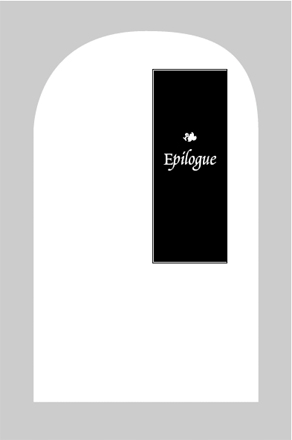

S HE LAY IN THE BRIGHT WHITE ROOM IN THE HOSPITAL in Orvieto feeling a constant, deep ache in her side, the strange, nagging hurt of something missing. It was some time since she'd recovered consciousness from the operation. Every fifteen minutes a nurse visited to check her condition, measuring her blood pressure, placing an electronic thermometer in her ear. On the stroke of the hour, marked by the booming cathedral clock, the doctor--Anna, she could think of her by no other name now--entered alone, closing the door behind her, then walking to the window to scold the children in the street. There was a group of them playing football, even at this late hour, shouting happily as they kicked the ball from wall to wall, the way children must have done here for generations, and would for generations to come.
Anna seemed younger than when they'd first met that morning. Perhaps the operation had lifted something from her own shoulders. Perhaps it was simply the performance of medicine, the act of delivering some kind of remedy for a physical imperfection, that was a reward in itself.
They went through the post-op conversation. She didn't feel too bad at all. What was worst was the sense of guilt, of shameful relief. It felt as if something bad that lurked inside her had now been excised. Something that would, in a different set of circumstances, have become a child, one she and Nic had longed for. The juxtaposition of these two opposites would be difficult to shake from her head.
Then came the details. She'd scarcely listened when the doctor had outlined the possibilities before. Now, there was no dismissing them. They'd performed a procedure called a salpingectomy, the removal of one of her Fallopian tubes by laparoscopy. The remaining tube was unharmed. Her chances of a successful pregnancy in the future were now reduced to somewhere above forty percent.
"You won't appreciate this yet," Anna continued, "but you were very lucky. Had you not come to us when you did, it could have become extremely serious indeed. A few years ago this would have been a major abdominal operation, with considerable risk. We get a little better each year. Now, it is up to you."
"To do what?" she asked, puzzled.
"To learn to deal with what has happened. You've lost a child, and the fact it was an unborn one, with no possible hope of survival, does not make it any less difficult to bear. That is how we are made. It is part of the process of trying to be a parent. Being a strong, young, intelligent woman, you will tell yourself this is really nothing at all. Just one of life's mishaps. You will merely leave here, put it in the past, go back to your young man and start all over again. Which you will, I feel sure. But you will also feel anxiety and resentment and bewilderment that such a cruel thing could happen, to you of all people. That's natural, Emily. Feel free to come here and talk to me if it helps. Any time. Orvieto isn't far from Rome. You can always phone."
Emily smiled. There was something in the older woman's manner--a simple, unspoken sentence, "I understand"--that made her feel a little better already.
"You're getting married in the summer," Anna added. "That would be a good time to start thinking of trying again. Here's a suggestion from a stuffy, old-fashioned, rural Catholic. Life is a journey, not a race, Emily. Be patient. Be a rebel for your generation. Try bearing a child in wedlock. I suggest you discuss this with your uncle. He can't wait to come in. If that's all right with you."
Emily shook her head. "My uncle?"
Anna's bright eyes flared with sudden outrage. "I knew that old goat lied! Messina swore you were his niece! The daughter of some American relative of his. How else do you think you got a private room?"
"Ah," Emily said quietly. "My uncle. I'd love to see him."
IT WAS INEVITABLE THAT, after the brief medical formalities--he already appeared to understand as much about her condition as she did--the conversation would turn inexorably to what had happened in Rome.
Arturo Messina explained what he knew--which seemed considerable--with the precise, composed directness she expected of a man of his background and experience. When he was done, he turned his face away from her and stared into the street outside, now dark, with just a single lamp to illuminate the old walls of the convent opposite, the night punctuated again by the continuing echo of ball against brick, and the distant laughter of the young.
"A woman's anger is different from a man's," Arturo said. "We find ourselves gripped by a sudden, cataclysmic fury. With a woman, anger lasts. Had I discovered what had happened to that boy when I should have, none of this would have occurred."
She reached out and took his hand. He looked weary and old.
"You could say that about so many things, Arturo. If Bramante had been a better father, if he'd been capable of controlling his temper and his weaknesses. If this woman had come to her senses over the years, instead of letting her hatred grow alongside his."
"None of these would have mattered if I'd found him," he said immediately.
"No. But we're not perfect, none of us. You did what you thought best. What else could you do?"
He nodded and said nothing, although she could sense his dissatisfaction.
"And Alessio?" she asked. "What will happen to him?"
He shrugged, as if there were few options to be considered. "The lawyers will run up some tidy bills about that. The charge, I imagine, will be an accessory to attempted suicide. The woman's death could be construed as self-defence. He had nothing to do with the other killings, or so he says, and Leo seems to believe him, so it must be true."
Arturo paused and looked down at her.
"What about the boy Giorgio first killed? Ludo Torchia?"
He grimaced. "Torchia was no boy."
"Then why didn't he tell you the truth? It would have been so simple...."
Arturo Messina laughed and squeezed her hand. "You know, you really do belong in a police force somewhere," he observed. "You tell me."
She considered the possibilities.
"Because he was just a boy. What Ludo was looking for was adulthood, and he believed the only way to find it was through some ritual. Any ritual. It was simply that Giorgio provided a convenient one. A ritual that bound them together, in some kind of implicit secrecy Torchia felt he couldn't break. Not even in circumstances like those."
Arturo nodded.
"Especially in circumstances like that, don't you think?" Emily continued. "When is a warrior most tested? In extremis. It makes no sense, not in our world. But it's not for us to appreciate what they believe. All that matters is that it was real to those concerned. Ludo was terribly flawed. I imagine little else was real to him. He told Giorgio the truth. That he'd no idea what had happened to Alessio. Giorgio didn't believe him. And so he killed him."
Next page
